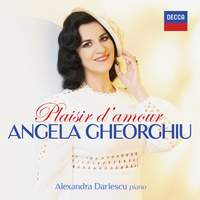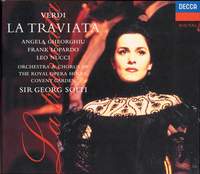Interview,
Angela Gheorghiu on Plaisir d'amour
 25 years ago today, the BBC hastily rearranged their schedule to broadcast a remarkable performance of La traviata from Covent Garden, starring the 29-year-old Romanian soprano Angela Gheorghiu as Violetta; the production garnered rapturous reviews for its leading lady and was subsequently released by Decca on CD and DVD. To mark its anniversary, Gheorghiu has returned to the label this year to record an album of songs by composers including Richard Strauss, Rameau, Debussy, Rachmaninov, and her compatriots George Stephănescu and Tiberiu Brediceanu.
25 years ago today, the BBC hastily rearranged their schedule to broadcast a remarkable performance of La traviata from Covent Garden, starring the 29-year-old Romanian soprano Angela Gheorghiu as Violetta; the production garnered rapturous reviews for its leading lady and was subsequently released by Decca on CD and DVD. To mark its anniversary, Gheorghiu has returned to the label this year to record an album of songs by composers including Richard Strauss, Rameau, Debussy, Rachmaninov, and her compatriots George Stephănescu and Tiberiu Brediceanu.
I spoke to her last month about how she put the programme together, the great Romanian sopranos who inspired Strauss, and her memories of that landmark Traviata with Sir Georg Solti.
The Romanian songs which open the album are probably the least familiar items to many listeners - could you tell me a little about them?
These are songs which I learned when I was a student, as these composers are very famous in my country and are studied a lot by beginners: in a sense they are like lieder for us, but there are also a lot of folk qualities in them so that they almost sound like popular songs. At least one of them was sung by a very famous Romanian singer, Hariclea Darclée, who was the very first Tosca – she was a lady with a lot of character and it’s thanks to her we have 'Vissi d’arte', because she begged Puccini to write her an aria right there in the rehearsal! These songs are part of my music, my country and my culture, and for me it’s absolutely necessary and very beautiful to share that with a wider audience: whether you are American, Russian, French, Italian or Spanish, something special always happens when you sing your own music.
What I wanted to do was put together a wonderful ceremony of composers from around the world: having an entire CD of Brahms or Schumann or Schubert is too much, for me. I actually find a lot of German lieder very boring, if I’m honest, and unless you’re a German singer singing German lieder in Germany I think it’s more interesting to mix things up; I’ve also kept things fresh by learning some new songs for the album as well as things I’ve known since I was very young. The Rameau I sang in my first year of study, when I was 17 or 18; I studied baroque style a lot right at the beginning, and for my very first appearance on live television in Romania when I was 18 I sang Purcell’s Music for a While with a spinet. I still really love those old instruments and repertoire.
The Russian songs I’d sung only in concert, but I really wanted to record them; Tosti’s beautiful Sogno was new to me, as were the Spanish songs (some of those were written for the Brazilian soprano Bidu Sayão, who was also a great Violetta and Mimì). I’d never sung Strauss’s Cäcilie before, and that’s a tough one: it’s very operatic, like something from La Wally. I think of it as German verismo!
Speaking of Strauss, do you still plan to perform the Four Last Songs – and do any of his operatic roles attract you?
Yes, I’ve already learned the Four Last Songs and it was supposed to happen in Oxford this summer; I caught a very heavy cold and had to cancel, but I love them and I will do it eventually! I don’t sing a lot of Strauss, partly because I don’t speak German – I understand a little, but I’m not fluent as I am in Italian and French, and when I’m preparing a role I like to understand the meaning of each word. I have colleagues who’ve built huge careers singing in languages which they don’t speak at all! I cannot do that; I am not a machine or a parrot, and I need something logical. I do find it interesting that Strauss wrote a lot for Romanian sopranos: he composed several roles (including Arabella and the Countess in Capriccio) for Viorica Ursuleac, and Aminta in Die schweigsame Frau for Maria Cebotari. Those two ladies were some of the most important singers of Strauss’s generation; Cebotari, who’s one of my heroines, also sang Salome and Daphne, and Sophie in Der Rosenkavalier.
Der Rosenkavalier is an opera which I love - the duets and trio are absolutely fantastic, ravishing stuff - but with all my respect there are a lot of Strauss operas which I really don’t like (or maybe it’s more accurate to say my voice doesn’t like…!). ‘Ravishing’ is not a word I’d ever apply to Salome, for instance - it is tough, and she and Elektra are not for me at all. I don’t have that kind of huge voice; I prefer to stick to a beautiful voice, and that’s another kind of sensibility altogether. I find it very telling that Maria Callas sang German repertoire at the beginning of her career because she thought she had a very big voice, but after a year or two she never touched it again and she sang only Italian and French opera. If you sing those huge roles early in your career it’s almost impossible to keep the voice beautiful - you cannot do a Traviata with a tough voice!
Do you have any favourite venues when it comes to singing recitals?
I like the Musikverein in Vienna, the Concertgebouw in Amsterdam, and in London I love everything – don’t touch my London! I will happily sing anywhere in London, and it’s actually been my home for my entire professional life. In 2020 it will be thirty years since I did my first audition at Covent Garden, and it’s amazing to look back on three decades of concerts and opera in such a wonderful city. London took me to its heart from the beginning, and I was so lucky to get to know everybody in the Royal Family; I have such fond memories of Princess Diana coming to my performances, and also Prince Charles and your fantastic Queen. In London you have such a history of music, and I really adore this about your country. As someone who grew up in a very different environment, I would urge you all to step back and truly appreciate that, because when you live in such a country you come to think this level of cultural richness is normal: No, no – it is not! And it’s not just about the variety of music on offer, it’s also about the level of artists: if you have a free evening in London there’s so much choice that you honestly don’t know where to go!
How did that first audition at Covent Garden play out?
I sang ‘Depuis le jour’ from Charpentier’s Louise (that’s one of my favourite arias, and I’d already sung it on Romanian television and radio) and Mimì, and after I finished Peter Katona turned to me and said ‘So, do you want to sing Bohème for us?’. 'Of course!' I said; 'That’s why I’m here!'. He was so satisfied with what he’d heard that he phrased it almost like a joke, and I found that rather sweet. That same day he sent me the dates for the production of La bohème, and that was how I really started my career in your country.
And we’re also coming up to the anniversary of your Traviata broadcast and recording from Covent Garden…
Yes, it’s 25 years in December, and it still seems like a dream. It was my very first live recording as well as my first recording with Decca, and it was a first for the label and for the BBC too - Decca had never recorded a live opera before, and the BBC rearranged their schedule to make history with the first-ever live broadcast from Covent Garden. It’s such a wonderful memory, and going back to Decca for this new recording feels like my return to my other home, my very first love.
How does it feel to revisit that production – either through the recording or through the revival?
Oh, it makes me so proud. I sang Traviata at Covent Garden again a few years ago and they still have this production – even when houses do introduce new stagings, my productions have really become reference-points, so I’m very pleased to have that legacy too. I remember when the designer asked me what I wanted to wear for the first act: I had seen a painting in Vienna of one of the empresses, and I knew I wanted not an exact copy but something in that style, and they said ‘Angela, your wish will become true!’. Everyone trusted me, and that was also true of Sir Georg Solti. You cannot believe how he was with me, absolutely perfect: today I’ve sung with all the big conductors, but no-one else has ever treated me with the kindness that he did. He insisted on listening to my voice from all the points of the theatre: he left an assistant to conduct and went to all the levels (even right up into the gods) to listen to my voice, and then he asked the orchestra to play especially for my voice – imagine that as a young artist! He did everything possible to make me feel comfortable and loved, making sure that I never had to push my voice or worry about balance. And thirty years on, I tell you that no conductor in the world today will fight for a new singer like that; most conductors these days expect you to make them comfortable! This is why we don’t have real reference productions these days: for that to happen, the producer, the director, the costume and lighting designers all need to be thinking ‘Who is the big star?’. For Solti to do all of that for a child (because I was a child back then)…well, I was very lucky. We had plans to do an all-Verdi CD together, but he died not long into the project: we did get as far as recording three or four of the arias, though, and I’m so grateful to have those.
Angela Gheorghiu (soprano), Alexandra Dariescu (piano)
Available Formats: MP3, FLAC, Hi-Res FLAC
Angela Gheorghiu (Violetta), Frank Lopardo (Alfredo), Leo Nucci (Giorgio Germont), Leah-Marian Jones (Flora), Gillian Knight (Annina), Robin Leggate (Gastone), Mark Beesley (Dottore Grenvil), Richard Van Allan (Baron Douphol)
Royal Opera House Covent Garden, Sir Georg Solti
Available Formats: MP3, FLAC




